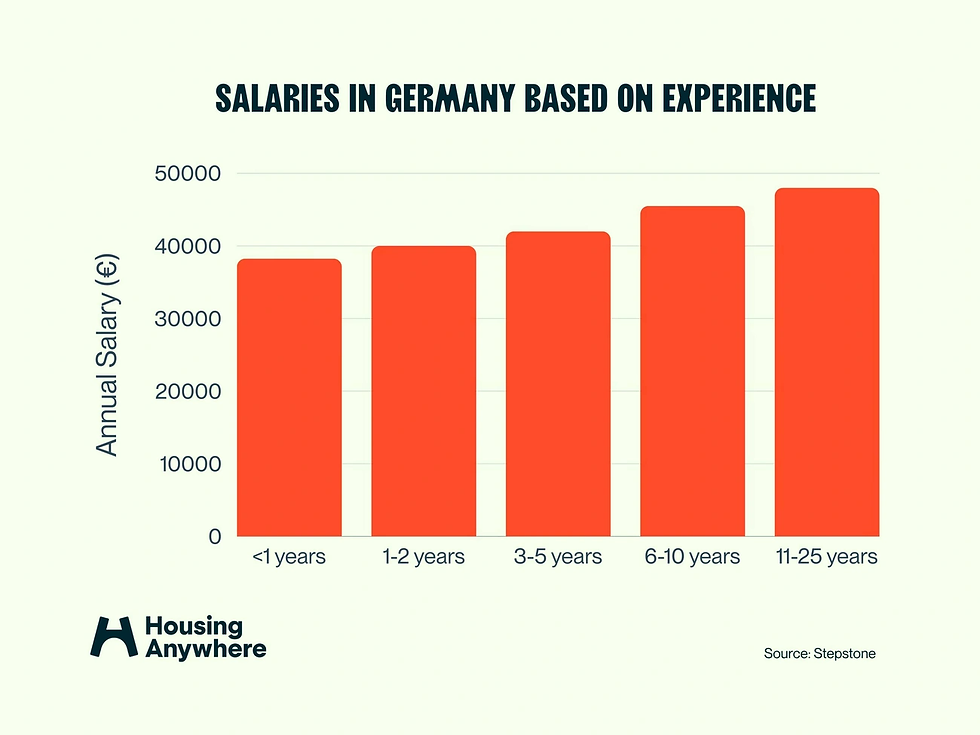13 German Industry Salary Ranges for Academics in 2025 [With Real Data]
- Dr. William Clark
- Jul 28
- 17 min read

German academics enjoy excellent salary prospects in 2025. PhD holders earn 40 percent more than their counterparts with master's degrees right after graduation . Your academic credentials could land you a rewarding industry position. The timing couldn't be better - Germany has emerged as a hub of innovation with just 3.2% unemployment and companies that need skilled professionals .
Monthly salaries in Germany vary based on industries and locations. R&D engineers take home around 62,000 € each year , and technical R&D specialists earn close to 60,000 € annually . The software engineering field stands out with technical leadership roles that command impressive packages of 110,000 € . The country's economic landscape shows a gross median salary of 45,800 € . Larger organizations tend to pay more - companies with over 5,000 employees offer median salaries of 57,750 € . This piece details expected compensation in 13 key industries to help you move from academia to the German job market.
Contents

Image Source: INOMICS
German academic institutions have structured salary frameworks that bring stability and transparency to research positions. Academic salaries follow standardized pay scales that create clear paths for career growth, unlike private sector jobs.
Average salary for academics in Academia and Research Institutions
German academic salaries work under collective civil service agreements that use TV-L (state universities) or TVöD (federal institutions) pay scales [1]. Research and development engineers in industries of all types earn around 62,000 € per year before taxes [1].
The system places academic employees into three pay levels – E13, E14, or E15 based on their qualifications and job duties. A full-time academic at E13 level (level 6) can earn up to 6,580 € monthly before taxes as of February 2025 [1]. E14 positions pay up to 6,998 € monthly, and E15 positions reach 7,640 € [1].
The German Research Foundation (DFG) sets standard rates for research funding that match these salary structures. Their calculations show monthly costs of 7,350 € for postdoctoral researchers and 10,300 € for professorship positions [2].
Entry-level vs senior-level pay in Academia and Research Institutions
Academic salaries in Germany show significant growth from entry to senior levels:
Entry-level positions (PhD students):
Mid-level positions (Postdocs):
Senior positions (Professors):
Professor's base salaries vary significantly between German states. Bavaria pays the highest W3 salaries at 8,038-8,646 € monthly, while Hamburg's base pay starts at 6,909 € [4].
Key academic roles in Academia and Research Institutions
The German academic system has several clearly defined roles:
Doctoral candidates/PhD students – They work as research assistants while completing their dissertations
Postdoctoral researchers – They typically get fixed-term contracts up to six years after finishing their PhD [3]
Research group leaders – They manage small teams as independent researchers
Junior professors (W1) – These early-career academics sometimes have tenure-track options
Professors (W2/W3) – They hold permanent positions with teaching, research, and administrative duties
Academic roles come with benefits like performance bonuses (up to 25% of base salary), good vacation policies, and job security, which help make up for lower salaries compared to industry jobs [1].

Image Source: Terratern
Medical research jobs in Germany provide some of the best pay packages you can find in academia, especially with advanced degrees. The blend of clinical work and research creates a unique pay structure that rewards both education and expertise.
Average salary for academics in Healthcare and Medical Research
German medical research scientists earn around 78,967 € per year - about 6,580 € monthly [5]. This is a big deal as it means that their earnings are well above the national median, showing how much medical expertise is valued. Scientists who take on more responsibilities can earn even more, with yearly salaries reaching 111,714 € [5].
Doctoral students in medical research get competitive pay based on collective bargaining agreements. Their monthly gross earnings range from 4,200 € to 4,800 € [1]. Postdocs earn between 5,000 € and 6,000 € monthly, depending on their experience [1].
Entry-level vs senior-level pay in Healthcare and Medical Research
Experience plays a huge role in medical research salaries:
These numbers show how much expertise matters in the field. Medical professors can earn up to 8,000 € monthly, plus extra performance bonuses they negotiate with their universities [1].
Key academic roles in Healthcare and Medical Research
Most positions need advanced degrees - 72% of medical research scientists have doctorates [5]. The core team includes:
Research scientists who study disease mechanisms, treatments, and preventive measures
Clinical researchers who connect lab findings with patient care
Research group leaders who guide specialized investigation teams
Salary trends in Healthcare and Medical Research
The future looks bright for medical researchers in Germany. Experts predict an 11% salary increase over the next five years. Average earnings should reach about 88,045 € by 2030 [5]. Education continues to be valuable - those with doctoral degrees earn more than their colleagues with bachelor's or master's degrees.

Image Source: academics
German engineering jobs provide excellent salaries when academics move into industry positions. Their research expertise and academic background help them earn premium compensation packages.
Average salary for academics in Engineering and Applied Sciences
German engineering academics receive salaries through two frameworks: the Collective Agreement for Public Service Workers (TVöD) and the Collective Agreement for the States (TV-L) [6]. Research assistants earn between 4,200 and 6,100 € monthly when they don't have supervisory duties [6].
Engineering professors' compensation follows the W salary scale:
W1 (junior professors): 4,600-5,300 € monthly
W2 (professors): 5,700-7,000 € monthly
W3 (professors in leadership positions): 6,500-8,000 € monthly [6]
Engineers who switch from academia to industry can expect yearly salaries between 55,000 and 70,000 € based on their specialty [7].
Entry-level vs senior-level pay in Engineering and Applied Sciences
Engineering salaries in Germany grow significantly with experience:
Professional Experience (years) | Gross Annual Salary (€) |
1-2 | 52,972 |
3-5 | 60,000 |
6-10 | 69,800 |
11-15 | 76,091 |
16-20 | 85,390 |
New engineers usually start at 45,000 € per year. Software engineers earn more, starting around 55,000 € annually [8].
Key academic roles in Engineering and Applied Sciences
Research engineers, laboratory directors, and department chairs represent the core academic engineering positions. HAW professors at Universities of Applied Sciences often become civil servants and can earn additional merit pay on top of their base salary [9].
Regional differences in Engineering and Applied Sciences
Salary levels vary considerably across Germany. Southern states pay more than northern and eastern regions [4]. The highest-paying cities include:
Stuttgart: 74,785 € annually
Frankfurt: 71,840 € annually
Munich: 70,000 € annually
Nuremberg: 70,296 € annually [6]
Nuremberg and nearby areas offer the highest regional median at 66,200 € because many industrial employers are located there [6].

Image Source: Leverage Edu
Germany's tech sector is one of the most innovative industries. It creates a need for IT academics in research institutions and private companies. The digital world provides lucrative paths for computer scientists who want to advance their careers.
Average salary for academics in Information Technology and Computer Science
Academic salaries in computer science follow public service pay scales. Doctoral candidates earn between 4.600 € and 5.800 € gross monthly. These payments align with the E13 level of state (TV-L) or federal (TVöD) collective bargaining agreements [3]. Postdoctoral researchers get between 5.000 € and 6.500 € monthly on E13 or E14 levels [3]. Professors receive compensation based on the W salary schedule (W1, W2, W3). Their monthly gross salaries range from 5.000 € to 10.000 € [3].
IT specialists who move to industry positions can expect much higher compensation. The average IT salary in Germany is 65.421 €, which exceeds the national average by 32.8% [10].
Key academic roles in Information Technology and Computer Science
The main academic positions include:
Research Scientists: They often specialize in artificial intelligence, cybersecurity, or data analytics
University Lecturers: They combine teaching with research responsibilities
Research Group Leaders: They direct specialized investigation teams
Computer science academics often move into industry roles. These include software architects (average 81.500 € annually), cloud architects (78.822 € annually), or cybersecurity engineers (103.888 € annually) [10].
Salary trends in Information Technology and Computer Science
The need for IT specialists remains high, with about 124,000 open positions in 2023. This shows a 50% increase from the previous year [10]. Salaries will grow steadily. Computer scientist salaries should reach 131.471 € by 2030, an 11% increase over five years [11].
Experience plays a big role in earning potential. Entry-level computer scientists (1-3 years experience) earn about 82.652 € annually. Senior-level professionals (8+ years) can make up to 146.470 € [11]. Regional differences matter too. Munich, Berlin, and Frankfurt offer the highest pay in the technology sector [12].

Image Source: INOMICS
German business graduates enjoy some of the most stable and varied salary structures. Their pay depends on their specialty, industry, and where they work. The field rewards academic effort with great pay packages.
Average salary for academics in Business and Economics
German economists earn around 95,667 € yearly or about 46 € per hour [13]. Business and management graduates take home roughly 78,572 € each year [14]. Economics professors earn even better, with yearly salaries reaching 119,749 € plus bonuses of about 5,556 € [15].
MBA graduates have great prospects ahead. They start with salaries between 65,000 € and 85,000 € [2]. The numbers go up in specific sectors. Consulting roles pay 80,000-100,000 € while finance positions offer 75,000-95,000 € yearly [2].
Entry-level vs senior-level pay in Business and Economics
Your experience makes a big difference in how much you earn in business:
Business careers show great growth potential. Experts predict salary increases of 11% in the next five years [13].
Education level's effect on Business and Economics salaries
Your education level really shapes what you earn in business. People with master's degrees start out earning 14% more than those with bachelor's degrees [16]. Getting specialized business qualifications boosts earning potential - that's why 57% of economists have master's degrees [13].
Your university's reputation matters too. Students from "excellence" universities earn monthly gross wages of 2,019 €. This is higher than graduates from non-excellence universities who get 1,865 € [17]. Location plays a big role as well. North Rhine-Westphalia, Hesse, and Rhineland-Palatinate offer the best business salaries at around 62,000 €. Eastern regions pay less, with averages near 40,000 € [16].

Image Source: academics
Germany's growing sustainability sector offers rewarding opportunities to environmental specialists with academic credentials. The public and private sectors actively seek qualified researchers as climate initiatives gain more attention.
Average salary for academics in Natural Sciences and Environmental Studies
Environmental studies professors earn a gross salary of 65,776 € yearly, which breaks down to about 31.62 € per hour [18]. These professionals also receive yearly bonuses around 1,730 € [18]. Natural sciences graduates rank among Germany's top earners with starting salaries of 52,000 € per year. Environmental science graduates start at 41,000 € [1].
Your education level shapes your earning potential significantly. Environmental studies professors split evenly between master's degree holders and those with doctorates [18].
Natural sciences and engineering postdoctoral researchers typically earn between 55,000 € and 72,000 € yearly [19].
Key academic roles in Natural Sciences and Environmental Studies
The environmental sciences sector creates various career paths such as:
Research scientists at universities and research institutes
Environmental protection specialists at NGOs
Technical consultants for construction firms and architects
Planning officers in municipal government
Environmental management professionals in energy and chemical industries
Field specialists usually work in public research institutions or private industry. Private sector jobs tend to pay more [20].
Salary trends in Natural Sciences and Environmental Studies
Your experience level dramatically affects your earning potential in this field:
Environmental studies professor salaries look promising. Projections show an 11% increase by 2030, reaching about 73,337 € [18]. Regional differences exist - Karlsruhe's environmental studies professors earn 3% less (63,762 €) than the national average [21].
Public sector jobs follow clear pay scales with transparent progression. Private companies often start with higher salaries but offer less predictable advancement [20]. Academics moving to industry should weigh these factors carefully before making their choice.

Image Source: Statista
German graduates with humanities and social sciences degrees often struggle to chart their career paths. Traditional academic routes rarely point to specific industry jobs. The sector rewards well when these graduates successfully move from academia to specialized roles.
Average salary for academics in Social Sciences and Humanities
Humanities teachers in Germany earn a gross salary of 70,376 € per year or about 34 € per hour. They also receive average bonuses of 1,992 € [22]. Social science researchers make less, with yearly gross salaries of 57,525 € and hourly rates near 28 € [23]. University humanities professors earn much more, with yearly averages of 89,211 € plus bonuses of 3,105 € [24].
Education plays a big role in earning potential. About 38% of social science researchers have master's degrees and another 38% hold doctorates [23]. Humanities courses may not prepare students for specific jobs, but the university degree often proves more valuable than specialized knowledge [25].
Entry-level vs senior-level pay in Social Sciences and Humanities
Experience leads to substantial salary growth in these fields:
New job seekers can expect their salaries to grow about 11% over five years. This applies to both social science researchers and humanities professors [23].
Regional differences in Social Sciences and Humanities
University lecturers and academic staff salaries differ across German federal states [26]. Each state handles its academic employee payments differently. Job seekers should look up regional salary scales before they accept positions.

Image Source: Terratern
Teaching jobs in Germany follow regulated pay structures that each federal state controls. This creates clear career paths for academics who have educational credentials.
Average salary for academics in Education and Teacher Training
A teacher's salary depends on their school type, federal state, and professional experience. The system places state school teachers in pay grades A12 to A16, and their salaries grow with experience [5]. Primary school teachers across Germany (A12 grade) earn between 3,117 € and 4,613 € each month based on their experience and location [5]. Secondary school teachers get paid about the same, while grammar school teachers earn more in the A13 grade - anywhere from 3,497 € to 5,178 € [5].
Key academic roles in Education and Teacher Training
The German education system has several distinct teaching roles:
Position | Average Annual Salary | Grade Classification |
Primary School Teacher | 40,000-50,000 € | A12 |
Secondary School Teacher | 45,000-60,000 € | A12-A13 |
Vocational School Teacher | 50,000-65,000 € | A13 |
Special Education Teacher | 42,000-55,000 € | A12-A13 |
Preschool Teacher | 30,000-40,000 € | Varies |
Salary expectations in Education and Teacher Training
Monthly salaries differ between federal states. A primary school teacher's original salary in Hamburg starts at 3,478 €, while in Rhineland-Palatinate it begins at 3,116 € [5]. Teachers move up the pay scale every three years during their first decade and then every four years after that [5]. The civil servant status lets teachers keep about 70% of their gross salary after taxes, which makes this benefit a big deal [5].

Image Source: academics
German pharmaceutical companies create excellent career paths for academics who want to move from laboratory research to commercial development. These companies particularly value advanced degrees and actively seek specialized experts.
Average salary for academics in Pharmaceutical and Life Sciences
Life science professionals in Germany can expect to earn around 65,000 € gross per year [27].
A pharmacist's average annual salary reaches 41,290 €, with a range from 29,000 € to 71,000 € [28]. The broader pharmaceutical industry pays monthly gross salaries between 2,875 € and 7,901 € [29].
Academic qualifications boost earnings significantly in the chemical industry. Professionals with master's degrees earn 74,050 € annually, while doctorate holders receive 86,075 € [30].
Entry-level vs senior-level pay in Pharmaceutical and Life Sciences
Your experience level makes a big difference in pharmaceutical compensation:
A doctorate degree pays off right away. Chemists with PhDs earn about 10,000 € more per year than their colleagues without doctorates [27].
Salary trends in Pharmaceutical and Life Sciences
Life sciences salaries rose by approximately 9% from 2023 to 2024 [31]. Companies now focus more on base salary instead of variable compensation. This shift means higher fixed earnings but lower bonuses and equity [31]. Location matters too - pharmaceutical hubs pay better than areas with fewer industry players [31].

Image Source: Global Immigration Services
The automotive sector serves as the life-blood of Germany's economy. Academic professionals in this field enjoy competitive pay packages and exciting career paths.
Average salary for academics in Automotive and Mechanical Engineering
Automotive engineers earn impressive salaries that average 90,082 € per year. The pay scale ranges from 62,156 € to 109,900 € [32]. A mechanical engineer's typical annual salary reaches 64,500 € with bonus payments of about 5,000 € [33]. New graduates starting in vehicle manufacturing can expect around 54,188 € [34].
Different specialties come with varying pay scales:
Powertrain Engineer: 65,000-85,000 € annually
Electric Vehicle Engineer: 65,000-85,000 €
Automated Driving Systems Engineer: 70,000-95,000 € [35]
Key academic roles in Automotive and Mechanical Engineering
Academic professionals can pursue several rewarding paths:
Mechanical Design Engineer: Companies just need these professionals in automotive manufacturing
Robotics Engineer: Automation sector provides expanding opportunities
Thermal Engineer: Energy and automotive industries value these specialists
Project Manager: Leadership roles in engineering initiatives [33]
Regional differences in Automotive and Mechanical Engineering
Salaries vary significantly by location in Germany:
Munich: Mechanical engineers earn 70,000 € annually
Stuttgart: 68,000 € yearly in this automotive hub
Berlin: 60,000 € per year [36]
The size of an organization affects pay rates. Engineers working at companies with over 1,000 employees receive at least 5,000 € more each year compared to smaller firms [34].

Image Source: HousingAnywhere
The financial sector rewards academics who tap into their analytical skills through banking
and investment roles. Academic and industry positions show stark differences in this field.
Average salary for academics in Finance and Banking
Finance professionals earn premium compensation throughout Germany. CFOs with eight-plus years of experience make between 170,000 € and 350,000 € annually. Finance Directors take home 120,000 €–200,000 € [37]. Heads of Controlling with experience earn 120,000 €–180,000 € yearly [37]. Investment banking analysts start at 80,000 € per year and can reach 115,000 € with bonuses [6].
Impact of education level in Finance and Banking
Education level shapes earnings in finance significantly. MS in Finance graduates start at 50,000 €–80,000 € annually [38]. Their specialized knowledge helps them earn more in investment banking (60,000 €–80,000 €) than corporate finance (50,000 €–70,000 €) [38]. Advanced degree holders qualify for high-paying roles like private equity analysts (60,000 €–80,000 €) [38].
Salary scale in Finance and Banking
Finance compensation varies by roles and experience levels:
Banking professionals want hybrid work arrangements (89%) and flexible working hours (88%) [37].

Image Source: HousingAnywhere
German media and communication professionals blend analytical theory with hands-on experience in today's digital world.
Average salary for academics in Media and Communication Studies
German universities pay their communication academics according to standardized scales.
Junior professors (W1) earn between 4,913 € and 5,521 € monthly [40]. More experienced professors receive higher compensation—W2 professors make 5,565 € to 6,976 € monthly, while W3 professors can earn 5,543 € to 7,778 € monthly [40].
Each federal state manages its university lecturer's pay differently [41]. Professors can negotiate performance bonuses beyond their base salary. These bonuses typically add 10-20% to their total compensation [26].
Key academic roles in Media and Communication Studies
Communication graduates can choose from several career paths in academia and industry:
Public Relations Specialists: These professionals create communication strategies, manage social media presence, and protect their organization's image. They work as media spokespersons, content managers, and campaign managers [8].
Media Production Professionals: They contribute to film, radio, and television as directors, production managers, presenters, or editors [8].
Journalism and Editorial: These experts deliver factual information through research, evaluation, and content creation. They work as journalists, editors, reporters, or correspondents [8].
Media Analysis Experts: They conduct audience research, analyze target groups, and perform opinion research with their strong methodological expertise [8].
Industry roles often pay better than academic positions, particularly in media management and strategic communication.

Image Source: etainfi
Germany's sustainability sector continues to grow faster and rewards academics with competitive compensation packages based on their specialized expertise.
Average salary for academics in Renewable Energy and Sustainability
Compensation in renewable energy positions varies by specialization. Energy consultants earn an average of 49.495 € annually [42]. Renewable energy engineers receive higher pay at 74.770 € with bonus payments averaging 2.729 € [43]. Research and development managers in renewable energy earn premium compensation that reaches 115.044 € annually in Munich [44]. The annual earnings for sustainability specialists stand at 56.663 € [9], while consultants earn 62.470 € [45]. Physicists who work in renewable energy technologies often earn above-average compensation [46].
Salary trends in Renewable Energy and Sustainability
Sustainability professionals can expect their career outlook to remain strong. Salaries should increase by 11% over the next five years [43]. Renewable energy engineers' earnings might reach 83.364 € by 2030 [43]. Sustainability specialists and consultants can expect their earnings to grow to 63.176 € [9] and 69.651 € [45] respectively.
Entry-level vs senior-level pay in Renewable Energy and Sustainability
Your earnings in this sector depend heavily on experience:
Academics moving from research to industry positions will find significant growth opportunities in the sustainability field.
Comparison Table
Industry/Field | Entry-Level Salary | Senior-Level Salary | Average Base Salary | Key Academic Positions |
Academia and Research | 4,253-5,951 € | 6,700-7,800 € | 62,000 € | Research Assistant, Postdoc, Professor (W1-W3) |
Healthcare and Medical Research | 55,833 € | 97,848 € | 78,967 € | Medical Research Scientist, Clinical Researcher, Research Group Leader |
Engineering and Applied Sciences | 52,972 € | 85,390 € | 55,000-70,000 € | Research Engineer, Laboratory Director, Department Chair |
Information Technology and CS | 82,652 € | 146,470 € | 65,421 € | Research Scientist, University Lecturer, Research Group Leader |
Business and Economics | 66,277 € | 119,124 € | 95,667 € | Economist, Business Researcher, Economics Professor |
Natural Sciences and Environmental | 46,707 € | 81,436 € | 65,776 € | Research Scientist, Environmental Specialist, Technical Consultant |
Social Sciences and Humanities | 41,316 € | 87,203 € | 70,376 € | Social Science Researcher, Humanities Teacher, Professor |
Education and Teacher Training | 40,000 € | 65,000 € | 45,000-60,000 € | Primary Teacher, Secondary Teacher, Special Education Teacher |
Pharmaceutical and Life Sciences | 35,756 € | 71,000 € | 65,000 € | Pharmacist, Medical Advisor, Clinical Data Manager |
Automotive and Mechanical Engineering | 54,188 € | 109,900 € | 90,082 € | Mechanical Design Engineer, Robotics Engineer, Project Manager |
Finance and Banking | 63,434 € | 300,000 € | 80,000-115,000 € | Finance Associate, Investment Banker, Risk Manager |
Media and Communication | N/A | N/A | 4,913-7,778 € monthly | PR Specialist, Media Production Professional, Media Analyst |
Renewable Energy and Sustainability | 52,332 € | 92,875 € | 74,770 € | Energy Consultant, Renewable Energy Engineer, Sustainability Specialist |
Conclusion
German companies reward academics generously when they move to industry positions. Your advanced degree can boost your earning potential substantially across 13 sectors. PhD holders earn 40% more than those with master's degrees. These numbers vary between industries, but the education premium stays consistent.
Technical leadership roles in software engineering can reach 110,000 €, and senior investment bankers earn up to 300,000 €. Healthcare professionals, automotive engineers, and renewable energy experts also see great returns on their academic investment. Senior-level salaries in these fields range from 90,000 € to 120,000 €.
Location plays a big role in German industry positions. Bavaria and Baden-Württemberg's compensation packages exceed those in northern and eastern regions. Munich, Stuttgart, and Frankfurt lead the pack with the highest salaries in most sectors.
Your earning potential grows with experience in any industry. Senior-level professionals with 8+ years of experience typically earn 75-100% more than entry-level positions. IT, business, and finance sectors show the steepest growth.
Companies of different sizes offer varying compensation. Organizations with over 5,000 employees pay median salaries of 57,750 €. This is a big deal as it means that larger companies pay much more than smaller firms. Public sector jobs start with lower pay but offer better stability and clear career progression.
Germany's job market welcomes academics right now. With just 3.2% unemployment, companies just need specialized expertise. German employers value your research skills, analytical capabilities, and specialized knowledge.
These salary measures can help you assess opportunities and negotiate better packages. Your true market value reflects well in Germany's state-of-the-art economy.
References
[15] - https://www.salaryexpert.com/salary/job/economics-professor/germany[16] - https://www.munich-business-school.de/insights/en/2022/salary-expectations-after-studying-business/
[30] - https://en.gdch.de/education-career/career-and-profession/salary-information/starting-salaries.html



Comments